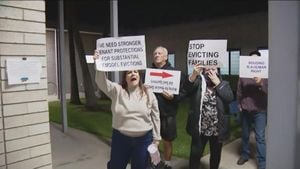The upcoming federal election in Germany has set the stage for intense political maneuvering and competition among various parties. With current Chancellor Olaf Scholz facing mounting pressure, the elections are likely to bring significant changes to the German political scene.
Germany, long seen as the political anchor of Europe, is grappling with its economic challenges and the potential for deindustrialization. According to Danyal Bayaz, the finance minister of Baden-Württemberg, the country has squandered the benefits reaped from globalization over the past 15 years. He articulates concerns over underfunding the public sector during times of low interest rates, particularly as Germany grapples with rising energy costs and growing competition from China.
These fears are echoed across various sectors as the nation prepares for elections scheduled for next year. The commissioning of innovative projects and the ability to pivot effectively are seen as key elements for the future economic resilience of the country. There’s palpable anxiety within the ranks of Schölz's administration, leading to speculation about whether he will salvage his position or if party support will wane as the election date approaches.
Political observers indicate the current government is at risk of losing popular support, especially amid public discontent with rising energy prices and global economic uncertainty. The situation is complicated by the looming threat of tariffs imposed by the United States under Donald Trump's administration, which could deal another blow to Germany's industrial sector.
This alarm over economic stability is compounded by demographic shifts and public sentiment, leading many voters to reassess their loyalties. Scholz's coalition partners, including the Green Party and the Free Democrats, also face their challenges. Critics argue they lack cohesive strategies to address the pressing issues at hand.
Sahra Wagenknecht, one of the leading figures from the Left Party, has been vocal about the need for comprehensive policy reforms to address mounting economic hardships. Her calls for change resonate with constituents who feel left behind by traditional parties. Meanwhile, the far-right Alternative for Germany (AfD) is capitalizing on these sentiments, promising to upend the status quo with bold rhetoric focusing on national interest.
The Social Democratic Party (SPD), under Scholz's leadership, has suffered setbacks, reflected by their declining popularity in recent opinion polls. With recent discontent, there's increasing pressure for younger leaders within the party to take over duties closer to the election date, potentially moving the party's platform back to more traditional social democratic roots.
On the economic front, as Germany heads for elections, the chancellor’s party must navigate actualities such as slowing growth, compounded by inflationary pressures. Despite holding on to significant sectors like automotive and engineering, the fear of losing relevance to more agile competitors is increasingly palpable.
Climate change policy is another focal point, drawing diverging views among the parties. The Greens advocate for ambitious environmental initiatives yet face the significant task of convincing the electorate of their feasibility—particularly against the backdrop of rising living costs. This juxtaposition reveals the conflicting priorities witnessed not only within the coalition but also among the German people.
Germany’s political parties are now engaged in outreach to engage directly with the electorate. Various town halls, community meetings, and digital outreach are manipulating everyday concerns to garner votes. The strategies adopted by parties heading toward the elections are pivotal, as the lasting impacts of the pandemic and recent global disruptions are hallmark conditions shaping the political discourse.
Further complicators include the increasing polarization of German politics, particularly prevalent within the nationalist discourse pushed by parties like the AfD. Key narratives focusing on immigration and economic sovereignty have evolved significantly and continue to exploit inherent fears within German society.
The historical backdrop of these political trends has often led to severe ramifications at the polls. Observers are watching closely to see whether this election will follow suit or if new coalitions may emerge for galvanizing more encompassing platforms focused on national unity and economic resilience.
Looking toward the future, the outcome of the election not only shapes Germany's domestic policies but will also have noticeable ripple effects across Europe, particularly within the framework of European solidarity and economic cooperation. This election is not merely about who leads Germany but about how it will navigate through these tumultuous waters and reclaim its position as Europe's leader.
All eyes are set on the upcoming electoral battle, which promises to test established boundaries and provoke necessary conversations about Germany’s future.



